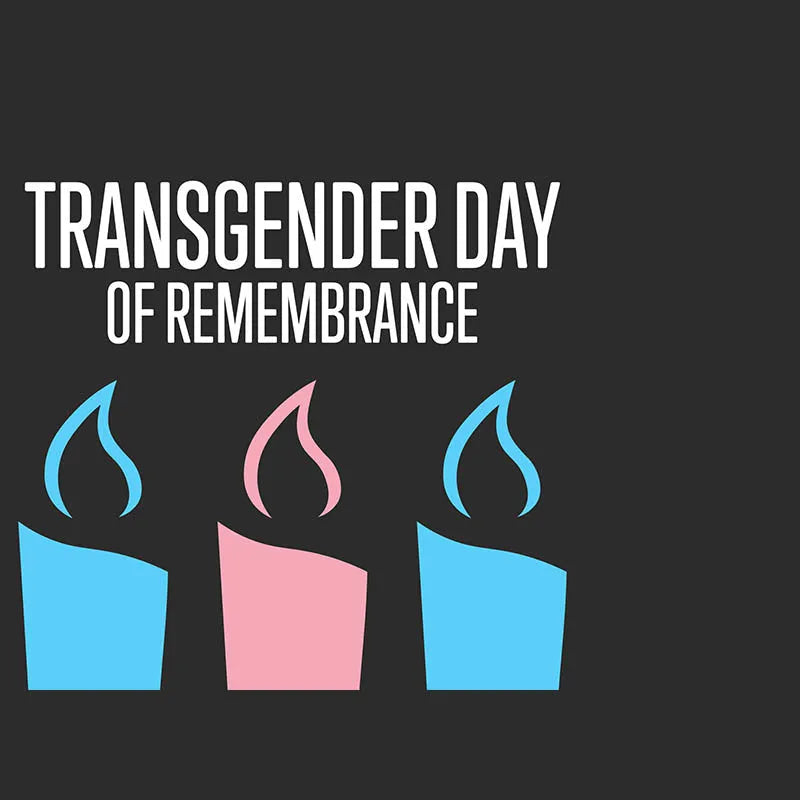
NOV 20th: TRANSGENDER DAY OF REMEMBRANCE
Transgender Day of Remembrance is held annually on November 20th to commemorate and pay tribute to transgender persons who have lost their lives. The unfortunate and sad killing of murder of Rita Hester, a transgender black female from the state of Massachusetts, on November 28, 1998, is the basis behind this date's commemoration.
Communities all throughout the globe observe vigils, memorials, and other events on this day to pay homage to and respect the transgender lives lost and to bring attention to the continued challenges that transgender community encounters daily.
It is crucial to highlight the incredible accomplishments and life experiences of black trans women who have helped to create a more welcoming and inclusive society within the rich fabric of LGBTQ+ history. The legacy of Crystal LaBeija, Potassa de la Fayette, Ajita Wilson, and Connie Fleming have been incremental to modern day music, dance and pop culture.
Crystal LaBeija (1960s)

Crystal LaBeija, born in 1936 and passing away in 1982, was a pioneering figure in the LGBTQ+ community, notably in the vibrant drag ball scene of the 1960s. As a black transgender woman, she founded the House of LaBeija, which became an iconic institution in drag culture. Crystal LaBeija was renowned for her sharp wit, elegance, and fearless determination to challenge racial bias within the drag pageant world. One of her most notable moments was during the 1967 Miss All-America Camp Beauty Pageant, when she vocally protested the unfair treatment of black and Latinx contestants. Crystal LaBeija's legacy extends beyond her contributions to drag; she became a symbol of resilience, breaking barriers for future generations of transgender individuals.
------
Potassa de la Fayette (1970s)

In the 1970s, Potassa de la Fayette was a trailblazing member of the LGBTQ+ community who made important contributions in her roles as a singer, actor, and model. She was a black transgender woman who was instrumental in shattering stereotypes and overcoming obstacles. Potassa is remembered as one of the few women of color and transgender who appeared in various popular TV films, such as Fox.Not only was she the first black woman to be featured in the movie Fox, but she was also the first black woman to show up in mainstream media.
She was a trailblazer during a period when there was little acceptance of transgender people because of her captivating personality and distinctive style. Because of Potassa de la Fayette's accomplishments, transgender people are now more visible and accepted in the entertainment industry.
------
3.Ajita Wilson (1980s)

In the 1980s, Ajita Wilson was a groundbreaking black transgender actress who had a big influence. Wilson, who was American-born before rising to prominence in European film, broke with social conventions and helped increase the portrayal of transgender women of colour in mainstream media. Known for her roles in erotic and exploitation films, Wilson fearlessly navigated the complex narratives of her films, showcasing her talent and charisma. Her career challenged stereotypes and brought visibility to the intersectionality of being black and transgender. Ajita Wilson's legacy continues to inspire, as she played a vital role in breaking down barriers and fostering greater inclusivity in the world of cinema.
------
4.Connie Fleming (1990s)

Connie Fleming, a prominent figure in the LGBTQ+ community during the 1990s, was a black transgender woman known for her contributions to the ballroom scene and activism. As a member of the House of Xtravaganza, one of the legendary houses in the ballroom community, Fleming brought her unique talent and style to the forefront. She gained recognition for her participation in the iconic documentary `Paris is Burning," which provided a glimpse into the vibrant ball culture of New York City. Connie Fleming's activism extended beyond the ballroom, advocating for the rights and visibility of transgender individuals. Her legacy lives on as a symbol of resilience, creativity, and advocacy within the transgender community.
------
Rita Hester

Rita Hester was a domineering person in the transgender community, particularly in raising awareness of the issue of violence against transgender persons. Annually, the LGBT community is commemorated in remembrance of her death, which took place in 1998. She was born in 1963. The horrific nature of her murder and the fact that it remained undetected only served to emphasize the pervasive animosity that transgender people—especially transgender women of color—face. TDoR is a day on November 20th each year that is dedicated to honouring Rita Hester and raising awareness of the systemic issues and violent crimes that affect the lives of transgender individuals.
Conclusion
In conclusion, Crystal LaBeija, Potassa de la Fayette, Ajita Wilson, and Connie Fleming stand as formidable pillars in the history of LGBTQ+ and transgender representation. Each of these remarkable black transgender women made indelible contributions to various realms, from drag ball culture to cinema and activism. Crystal LaBeija's fearless advocacy and founding of the House of LaBeija laid the groundwork for future generations of drag performers. Potassa de la Fayette broke barriers in mainstream cinema as one of the first openly transgender women of colour, while Ajita Wilson fearlessly navigated the complexities of her roles, challenging stereotypes. Connie Fleming, with her talent and activism, contributed significantly to the ballroom scene and broader transgender advocacy. Together, these trailblazers have left an enduring legacy, inspiring resilience, creativity, and the ongoing fight for transgender visibility and equality.










